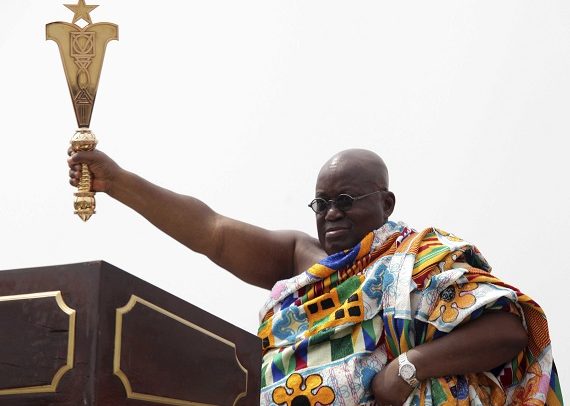It is well-documented that “during the year 2001, debt as a percentage of the GDP was not only unsustainably high and crippling but also deprived Ghanaians from money which could have been used for needed developmental and social projects.”
The fact though, is, the benefits of the HIPC were ‘unprecedented’ during the Kufuor’s regime from (2001-2008).
Macroeconomic indicators began to stabilize and Ghana’s debt stock was significantly reduced by about $4 billion within that period (BoG).
There were rapid infrastructural developments as well as social and policy reforms. Ghana was then moved from an HIPC economy to a middle income economy under the Kufuor administration (Mutaka Alolo, 2012).
By the end of 2008, Ghana’s economy had been quadrupled to US$28 billion, a period of eight years under the NPP. The average GDP growth of the NDC from 1993-2000 was 3.8% while that of the NPP from 2001-2008 was 5.2% with economic growth reaching 6.3% in 2007 (Daily Guide, 2016).
Disappointingly, however, during the Mills/Mahama’s eight years, they managed to uproot the good foundation laid by President Kufuor and his NPP government.
Take, for example, under Mahama’s government, Ghana’s total debt ballooned from GH¢9.5 billion to a staggering GH¢122.4 billion by the end of December 2016 with a little to show for.
This means that about 93% (i.e. GH¢113 billion) of Ghana’s total debt since independence was accumulated under NDC government from 2009-2016.
It is important to note that the previously single digit inflation and budget deficit doubled astronomically.
To be quite honest, Ghana went into the throes of economic collapse due to mismanagement and wanton corruption under the leadership of ex-President Mahama.
Take, for example, Ghana’s economic growth slowed for the fourth consecutive year to an estimated 3.4% in 2015 from 4% in 2014, as energy rationing (dumsor), high inflation and ongoing fiscal consolidation weighed on economic activity (World Bank, 2016).
Moreover, the high inflation rate remained elevated at 18.5% in February 2016, compared to 17.7% in February 2015, even after the central bank’s 500bps policy rate hiked (the inflation stood at 15.8 per cent as of October 2016).
Besides, President Mahama’s coarse government dragged the economic growth from around 14 per cent in 2011 to around 3.4 per cent as of December 2016.
So who says that all politicians are the same when in power?
Let us face it, it will be incongruous to put Akufo-Addo and Mahama in the same basket. This is because, the former has prudently introduced important policies and programmes in less than four years in power, while the later failed to introduce a single social intervention in eight years.
In addition, before the pernicious coronavirus, the Akufo-Addo government managed to move Ghana’s economic growth from a disappointing 3.4% under former President Mahama to around 8%.
And the previously double digit inflation (15.8 in December 2016) was reduced drastically to around 9.5% within a short space of time.
My dearest reader, would you be sincere enough and name just a single social intervention that had been implemented by President Mahama and his NDC apparatchiks who claimed to be social democrats?
In fact, it would only take a disputatious character to challenge the fact that the NDC faithful, who took pride in the social democratic ideology, were not in the business of promoting the welfare of the masses.
One would have thought that individuals who prided themselves as social democrats would be extremely empathetic to the needs of the masses, but this was not the case with the NDC as a party.
There is no denying or hiding the fact that the erstwhile Mahama government wilfully cancelled/collapsed the Nurse’s Allowance, the Teacher’s Allowance, SADA, GYEEDA, NHIS, the Maternal Care, the School Feeding programme, the Mass Transport System, amongst others.
Sadly though, since the inception of the Fourth Republican Constitution, the self-proclaimed social democrats have been opposing social interventions that have been proposed by the successive NPP governments such as the Free Maternal Care, the NHIS, the Metro Mass Transport, the School Feeding Programme, the Livelihood Empowerment against Poverty (LEAP) and the Free SHS.
Therefore, it is not entirely correct for anyone to assume that all politicians are the same once they are in their comfort zones, and therefore it is a complete waste of time to go out there and vote.
In any case, Ghanaians should not make the calamitous mistake by putting all politicians in a basket and thereby unfairly ‘crucifying’ a charismatic leader who can put forward expedient policies such as one district one factory, one village one dam, one constituency one million dollars, Free SHS, amongst others.
Take my word for it, dearest reader, the future is indeed looking bright under President Akufo-Addo, who against all odds, has managed to safeguard Ghana’s bauxite which Mahama’s administration shockingly decided to give away 58% to family and friends just about a week before exiting power.
- Badu, UK.
k.badu2011@gmail.com


